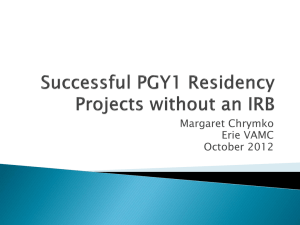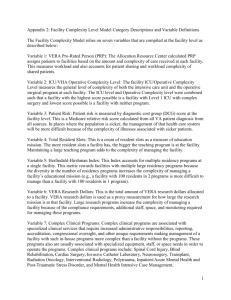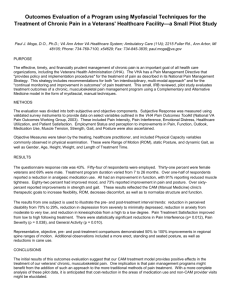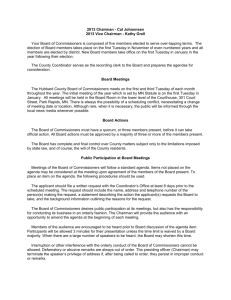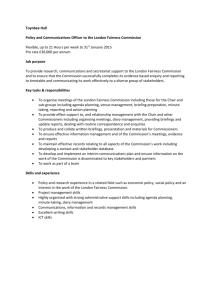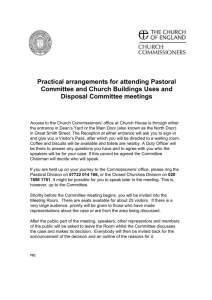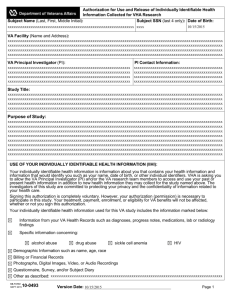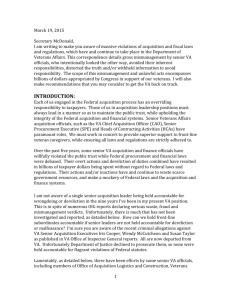POSITION DESCRIPTION
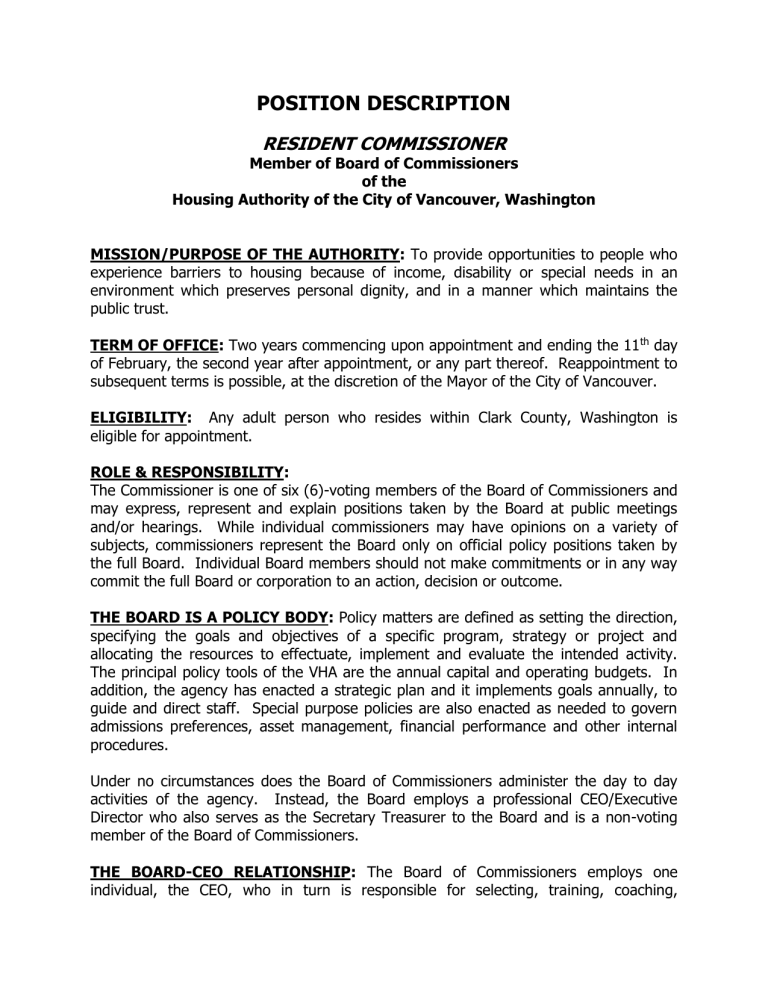
POSITION DESCRIPTION
RESIDENT COMMISSIONER
Member of Board of Commissioners of the
Housing Authority of the City of Vancouver, Washington
MISSION/PURPOSE OF THE AUTHORITY: To provide opportunities to people who experience barriers to housing because of income, disability or special needs in an environment which preserves personal dignity, and in a manner which maintains the public trust.
TERM OF OFFICE: Two years commencing upon appointment and ending the 11 th day of February, the second year after appointment, or any part thereof. Reappointment to subsequent terms is possible, at the discretion of the Mayor of the City of Vancouver.
ELIGIBILITY: Any adult person who resides within Clark County, Washington is eligible for appointment.
ROLE & RESPONSIBILITY:
The Commissioner is one of six (6)-voting members of the Board of Commissioners and may express, represent and explain positions taken by the Board at public meetings and/or hearings. While individual commissioners may have opinions on a variety of subjects, commissioners represent the Board only on official policy positions taken by the full Board. Individual Board members should not make commitments or in any way commit the full Board or corporation to an action, decision or outcome.
THE BOARD IS A POLICY BODY: Policy matters are defined as setting the direction, specifying the goals and objectives of a specific program, strategy or project and allocating the resources to effectuate, implement and evaluate the intended activity.
The principal policy tools of the VHA are the annual capital and operating budgets. In addition, the agency has enacted a strategic plan and it implements goals annually, to guide and direct staff. Special purpose policies are also enacted as needed to govern admissions preferences, asset management, financial performance and other internal procedures.
Under no circumstances does the Board of Commissioners administer the day to day activities of the agency. Instead, the Board employs a professional CEO/Executive
Director who also serves as the Secretary Treasurer to the Board and is a non-voting member of the Board of Commissioners.
THE BOARD-CEO RELATIONSHIP: The Board of Commissioners employs one individual, the CEO, who in turn is responsible for selecting, training, coaching,
Page 2 of 6 evaluating, leading and directing the remainder of the staff which operate the agency and its many programs. Problems, needs or concerns of the Board or individual Board members should be brought to the attention of the CEO, who will assign work within the agency as appropriate. The CEO works for the Board as a group, not 6 individuals.
Therefore, conflicting requests or the individual needs of individual Board members may not be able to be addressed by the CEO.
The Board-CEO relationship is structured and governed by an employment contract, which specifies how and when evaluations will be conducted. All performance evaluations are conducted in writing and their contents are a private matter between the Board and CEO. Pay and other forms of compensation are set by action of the
Board consistent with the provisions of the employment contract. The amount of pay given to the CEO as compensation is public information, however, meetings where performance, merit and pay are discussed are considered confidential.
LAWS GOVERNING CONFLICTS OF INTEREST, FAIRNESS AND OPEN PUBLIC
MEETINGS: Housing Authority Commissioners are identified in Washington State Law as public officials much like city councilmembers, school Board and utility district members. As such, Housing Authority Commissioners are expressly prohibited by law from benefiting personally from their office and may be charged with civil and/or criminal penalties should they do so. Conflicts of interest could involve selling property to the VHA, owning rental housing for which Section 8 Housing Assistance Payments are paid or having an interest in a business which contracts or provides services to the
VHA or its residents. The VHA does not employ family members of Board members and generally avoids employing any related individuals, especially if one could be placed in a supervisory position over one of their relatives.
Some narrow exemptions are extended to Resident Commissioners, as it is a precondition of their ability to serve that the Resident Commissioner is a “directly assisted individual”. However, other prohibitions cited above apply equally to all commissioners including the Resident Commissioner(s).
All decisions of the Board must be fair and under case law of the State of Washington must also appear to be fair. This legal doctrine, called the Appearance of Fairness
Doctrine, stipulates that Board members must disclose potential conflicts of interest and identify situations that could appear – to a third party – to be a potential fairness problem. Such disclosure must occur in public prior to deliberation, action or consideration of the subject of the conflict/fairness matter so as not to conceal from the public view any potential conflict. In some cases, a perceived conflict, once disclosed to their colleagues on the Board may be dismissed as a real conflict. In cases where a real conflict exists, the Board member shall step down from participation in the deliberation and leave the meeting temporarily so as not to gain privileged information or cause inappropriate influence on a topic, which would benefit or harm their personal interests. Failure to disclose said conflicts/appearances could invalidate the action,
Page 3 of 6 cause civil or criminal penalties to be levied against the individual and/or expose the
VHA to liability.
INSURANCE COVERAGE FOR DIRECTORS’ ERRORS AND OMISSIONS (E&O):
The VHA provides insurance coverage for mistakes, oversights and omissions of the
Board. However, coverage does not apply to willful acts of malfeasance, misfeasance or non-feasance. In short, coverage is not extended to intentional wrongdoing or acts of gross negligence. The best insurance against a claim, however, is to ask questions and disclose any potential conflicts of interest or perceived or real appearance of fairness problems. Failure to do so could invalidate insurance coverage and result in a claim against the personal assets of a Commissioner and/or civil or criminal penalties.
NOTIFICATION & MEETING PROCEDURES: State law requires that whenever a quorum (voting majority of 3 members for all but a few limited subjects which then requires 4 members) of the Board is present, the public, media and interested parties must be notified in writing at least 24 hours in advance. The notice must specify the time, place and purpose of the meeting. If the meeting is recessed to a different location, the original location must be posted with the location of the new meeting location.
All meetings of the VHA Board are open to the public unless one of three topics is subject of the meeting. These topics which are eligible for so-called executive sessions include: 1) real-estate sales or acquisition; 2) personnel matters including labor contract terms, the CEO employment contract and performance evaluation of the CEO; and 3) lawsuits including private discussion of legal strategy and settlement offers. No action whatsoever may be taken in Executive Session.
Recent case law in Washington State has found that e-mail exchanges between public officials is considered public information and that electronic dialogue between 3 or more members in real time or over an elapsed period constitutes a meeting, therefore subject to public notification and posting requirements. The text of such dialogues may be considered public information, even if the device used to transmit the messages are the personal property of individual commissioners or their businesses.
CONDUCT OF MEETINGS: The Chair of the VHA Board conducts meetings consistent with the VHA bylaws and Roberts’ Rules of Order. Each meeting is governed by an agenda or list of subjects and is taken in order as approved at the outset of each meeting. The Chair calls the meeting to order and calls each agenda item for discussion, deliberation and disposition by the Board. Agenda and supporting materials for all public meetings are provided approximately five (5) days in advance of each regularly scheduled meeting.
Page 4 of 6
In the absence of the Chair the Vice Chair performs the duties of the Chair. In turn, the
Second vice Chair fulfills the duties of the Vice Chair in the event of the absence of the
Vice Chair.
Actions by the Board consist of Resolutions and Motions; resolutions are subject to a roll-call vote and the Secretary or their designee will call the roll. Motions are subject to a voice vote, which is recorded by the Secretary or their designee. Votes may be for
(yea/yes) or against (nay/no) or abstention (absent or present). Members have a duty to disclose their positions on matters pending action to aid in the deliberative process.
If an issue is unclear or explanation of the subject at hand is needed, then questions should be asked of the appropriate individuals. No one should vote yes or no on something they do not understand. Individual members also have a duty to inquire about issues on the agenda for discussion and may contact the CEO between meetings to request additional information. Customarily, any supplemental information will be provided to all Board members, so each member has equal access to information. The purpose of deliberation is to identify issues, concerns, gaps or inconsistencies in information or conflicts in policy or procedures. Board members share their views on the subject at hand, which enables the Chair to move the issue to resolution or disposition. A vote to abstain is neither a vote in favor or against the agenda item.
Each meeting is recorded and a summary of the actions taken and deliberation is provided for each meeting. Upon approval of the minutes by the Board at each subsequent meeting, the minutes become the official record of proceedings and are filed in the VHA archives.
REMOVAL FROM THE VHA BOARD OF COMMISSIONERS: The Mayor of the City of Vancouver may remove a Board member for cause pursuant to State law. Cause may include excessive absenteeism (three unexcused absences within a 12 month period) failure to disclose conflicts of interest, or in the case of a Resident
Commissioner the determination that the individual is no longer directly assisted by the
VHA. Members should make every effort to inform the Board Chair or CEO of their inability to attend a given meeting to ensure the quorum requirements of state law are met.
TIME NECESSARY TO FULFILL THE DUTIES OF COMMISSIONER: The Board customarily meets monthly for up to 4 hours at a time. Regular meetings are scheduled on the fourth Thursday of each month, from 10:00 am to 12:00 noon and are subject to rescheduling as needed. Executive sessions and study sessions may be called prior to the regular meeting time. In that event, meetings may run from 8:00 am to 12:00 noon. The Board Chair calls special meetings occasionally, but not frequently. The
Chair and CEO make every effort to avoid family obligations and work demands when scheduling meetings.
Page 5 of 6
Approximately 2-4 hours per month will be needed to adequately prepare for upcoming meetings. In total, the minimum time required to fulfill the duties of commissioner is 8 hours per month. However, several members of the Board have agreed to represent the VHA on other Boards, taskforces, and committees and to attend public meetings of other allied groups. This is a likely expectation of the Resident Commissioner to adequately represent the VHA before the Clark County Residents Council.
COMPENSATION, REIMBURSEMENT AND TRAVEL ADVANCES: State law prohibits Housing Authority Commissioners from receiving compensation for their time preparing for or attending meetings. Members of the Board are eligible for reimbursement pursuant to adopted Board policy for auto mileage, travel and eligible business expenses. The VHA travel policy details the terms and conditions for such reimbursement.
The Board recognizes that travel reimbursement may constitute a burden on household budgets and has enacted a policy enabling a travel advance for members of the Board traveling to out of town meetings requiring hotel lodging, meals and other appropriate expenses. Travel by the Board (and staff) to official events is a privilege and members shall at all times represent the interests, values, policies and procedures of the
Vancouver Housing Authority.
PROFESSIONAL AFFILIATION/ETHICS: The VHA is an agency member of the
National Association of Housing and Redevelopment Officials and pays the cost of annual membership in NAHRO on behalf of all VHA Commissioners. NAHRO is the
Nations’ largest, oldest and pre-eminent professional association of housing and community development practitioners.
As a condition of NAHRO membership the following ethics policy applies to all VHA
Commissioners:
NAHRO Code of Professional Conduct
The purpose of the National Association of Housing and Redevelopment Officials is to be the leading housing and community development advocate for the provision of adequate and affordable housing and strong viable communities for all Americans, particularly those with low and moderate incomes, and to enhance the professional development and effectiveness of NAHRO members.
Each member of the Association will adhere to a Code of Professional conduct, which will support this purpose and pledges to:
Promote the public interest through the advocacy for responsible administration of housing and community development programs.
Perform their duties with the highest degree of integrity and professional care in order to merit the respect of the beneficiaries of programs elected officials and the general public.
Maintain the highest standard of personal integrity and conduct.
Exercise diligence, objectivity and honesty in professional activities.
Page 6 of 6
Avoid any activity, which is in conflict with their official duties, and not realize undue personal gain from the performance of official duties.
Serve the public with dedication, concern, courtesy and responsiveness.
Strive for professional excellence and encourage the professional development of their associates.
Promote and encourage the highest level of ethics within the industry.
This code of Professional Conduct of members of the National Association of Housing and Redevelopment
Officials has been adopted to promote and maintain the highest standards of personal and professional conduct among its members. Adherence to this Code is required for membership in the Association and serves to insure public confidence in the integrity and service of Association members.
SUMMARY AND CLOSING: The VHA has a long and proud history of service to the
Vancouver-Clark County region. Board members are instrumental in the leadership of the corporation and have major roles and responsibilities in the governance of VHA.
The effective policy governance of the VHA will enable it to continue to serve the housing needs of low and moderate-income Clark County residents in an effective manner.
